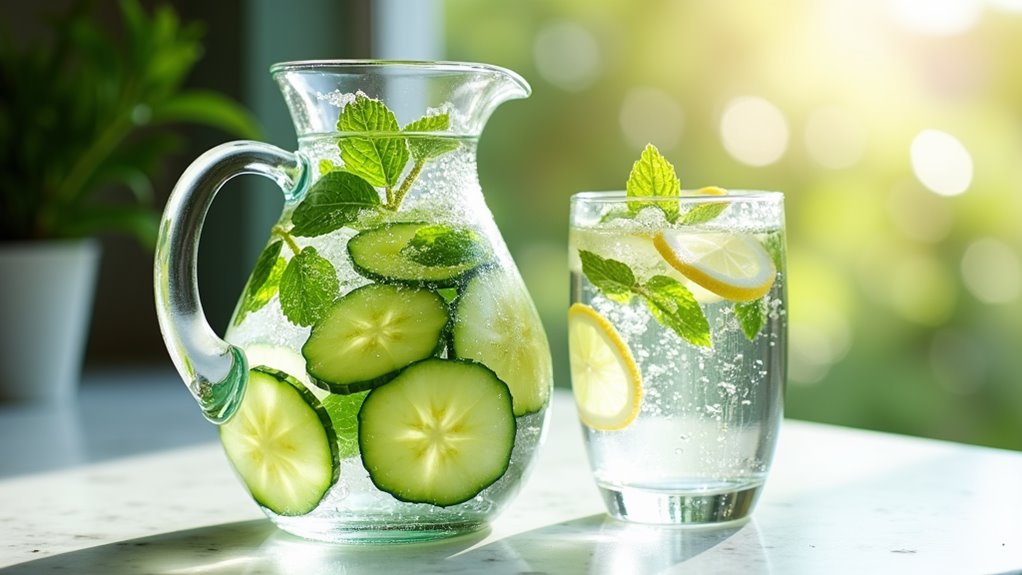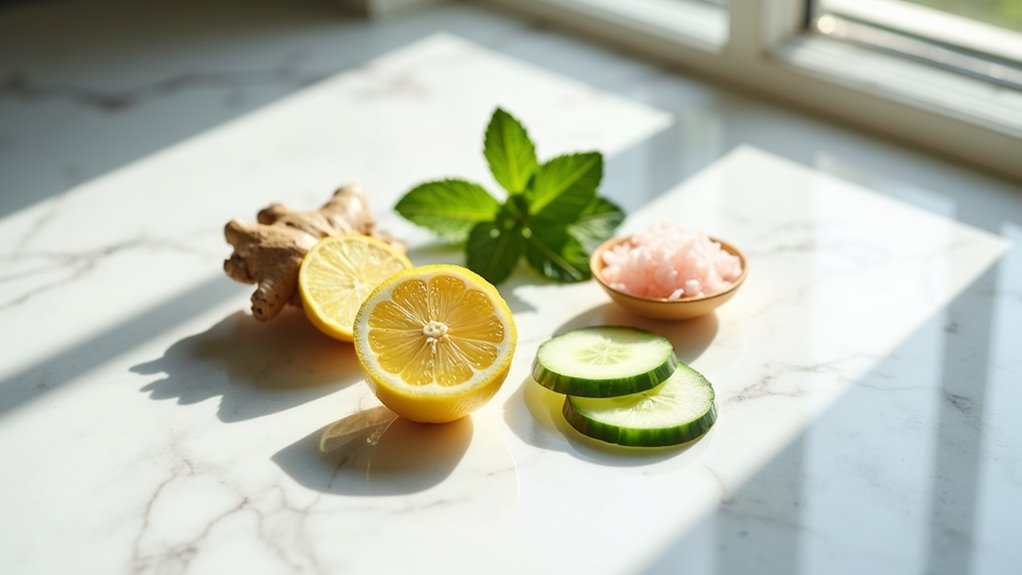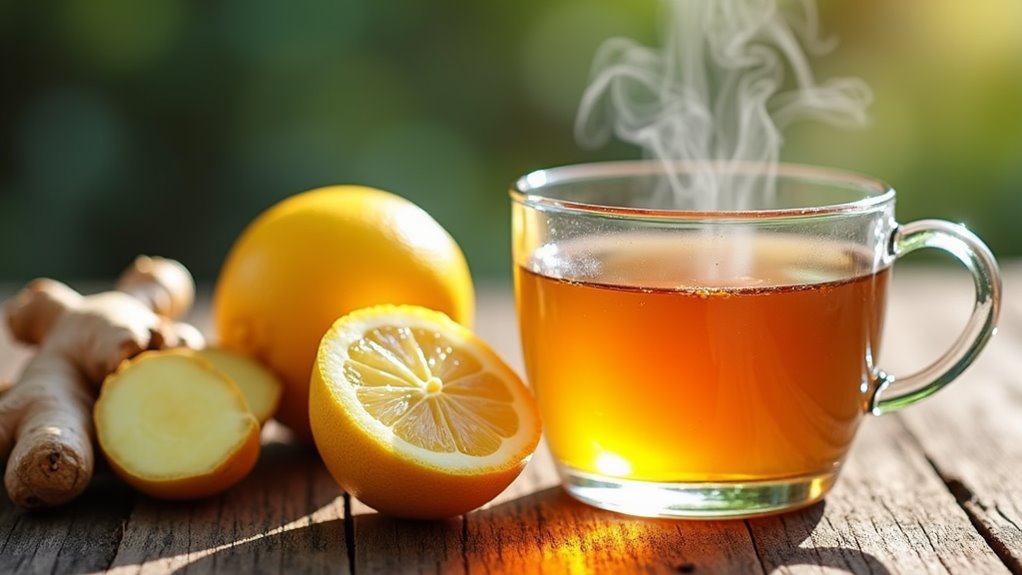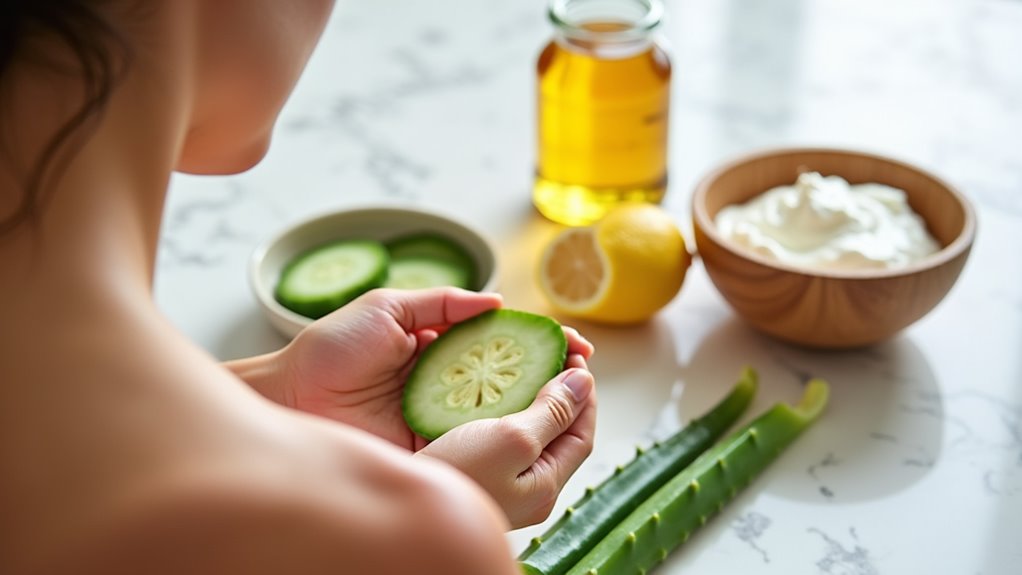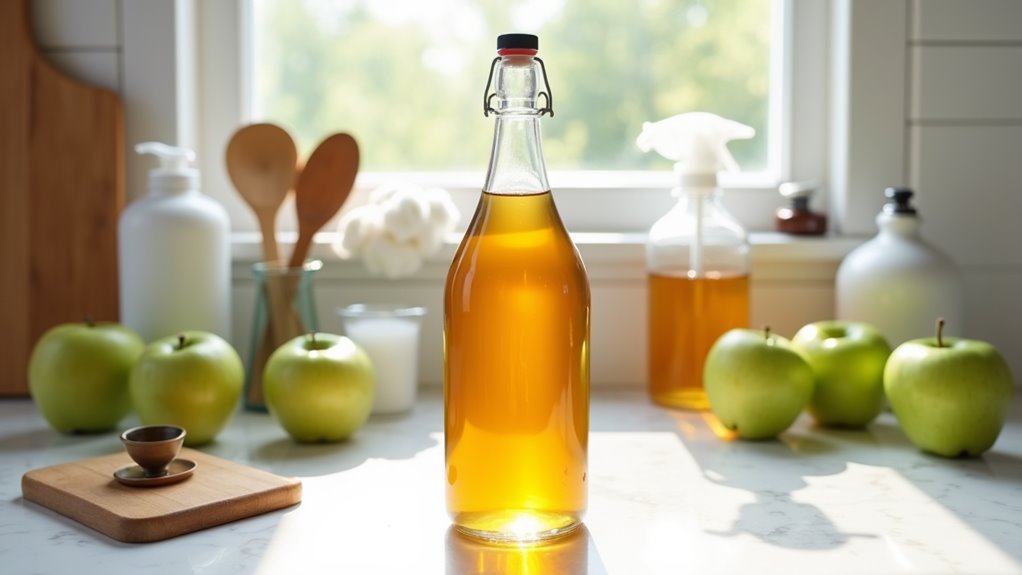Feel Lighter! The One Drink That Reduces Belly Bloating
Looking to beat belly bloat? Ginger tea is your natural solution. This powerful brew contains active compounds that stimulate digestion, reduce inflammation, and prevent gas buildup in your gut. You’ll find relief by sipping fresh ginger tea 30 minutes before meals or right after eating. For best results, simply simmer sliced ginger root in water for 10-15 minutes and add a squeeze of lemon. Discover how this ancient remedy can transform your digestive wellness.
What Causes Belly Bloating?
Although belly bloating can feel uncomfortable and frustrating, it’s often caused by common dietary and lifestyle factors. When you’re experiencing a bloated belly, it’s likely due to excess gas buildup in your digestive system, which can result from eating too quickly, consuming carbonated beverages, or chewing gum frequently.
Your bloating might also stem from food intolerances, particularly to dairy or gluten, making it essential to identify trigger foods. Consuming high-sodium foods, eating large portions, or having irregular eating patterns can contribute to water retention and bloating.
While many bloated belly remedies exist, understanding the root cause is crucial for finding effective solutions. Hormonal changes, stress levels, and lack of physical activity can worsen bloating symptoms. You might notice increased bloating during certain times of the month or when you’re particularly stressed.
In addition, poor gut health and imbalanced gut bacteria can also lead to chronic bloating issues.
The Science Behind Ginger Tea and Bloating
Among natural remedies for bloating, ginger tea stands out due to its scientifically proven digestive benefits.
When you drink ginger tea, you’re tapping into the power of gingerols and shogaols – active compounds that stimulate digestive enzymes and reduce inflammation in your gut.
These compounds work by speeding up gastric emptying, which means food moves more quickly through your digestive system. You’ll notice that ginger tea helps relax your intestinal muscles, preventing the gas buildup that causes that uncomfortable bloated feeling.
Research shows that ginger’s natural properties also combat nausea and support healthy gut bacteria.
When you make ginger tea part of your daily routine, you’re joining countless others who’ve discovered its ancient wisdom backed by modern science. Additionally, staying hydrated with natural ingredients can further enhance its effectiveness in reducing bloating.
Just steep fresh ginger root in hot water for 10 minutes, and you’ll have a powerful ally against bloating right in your cup.
How to Make the Perfect Anti-Bloating Ginger Tea
Creating the perfect anti-bloating ginger tea starts with selecting fresh, firm ginger root from your local market. Look for pieces with smooth, unwrinkled skin that feel heavy for their size. You’ll want about two inches of root per cup of tea.
Peel the ginger and cut it into thin slices to maximize the release of its beneficial compounds. Bring four cups of filtered water to a gentle boil in a pot, then add your sliced ginger.
Reduce the heat and let it simmer for 10-15 minutes, allowing the water to take on a golden hue.
For enhanced digestive benefits, you can add a squeeze of lemon and a small drizzle of raw honey once the tea has slightly cooled. Many tea enthusiasts also include a pinch of turmeric or a few mint leaves. Ginger’s natural anti-inflammatory properties also contribute to reducing discomfort in the digestive system.
Strain your tea into your favorite mug, and you’re ready to enjoy this soothing, belly-friendly brew.
Best Times to Drink Ginger Tea for Maximum Benefits
While many people enjoy ginger tea throughout the day, timing your consumption strategically can maximize its anti-bloating benefits. You’ll get the most out of your ginger tea by drinking it during key moments when your body needs digestive support.
| Time of Day | Benefits |
|---|---|
| Morning (Empty Stomach) | Kickstarts metabolism and digestion |
| 30 mins before meals | Prepares digestive system and reduces bloating |
| Right after meals | Aids food breakdown and prevents gas |
| Mid-afternoon | Reduces snacking and maintains energy |
| Before bedtime | Promotes better sleep and digestion overnight |
Remember to let your tea cool slightly before drinking, as extremely hot beverages can irritate your stomach. You’ll find that incorporating ginger tea into your daily routine becomes second nature, especially when you sync it with your meal schedule. Many members of our wellness community report feeling lighter and more energized when following these strategic timing guidelines. Additionally, taking ginger 30 minutes before meals can significantly enhance digestive enzyme activity, allowing for more effective food breakdown and minimizing discomfort.
Additional Health Benefits of Ginger Tea
Beyond its impressive bloat-reducing properties, ginger tea offers a remarkable array of health benefits that can boost your overall wellness.
You’ll be glad to know that this warming beverage can help ease nausea and morning sickness, making it a trusted companion during pregnancy or travel. It’s also a powerful ally in fighting inflammation throughout your body.
When you’re feeling under the weather, ginger tea can strengthen your immune system and help combat cold and flu symptoms.
If you’re dealing with joint pain or muscle soreness, you’ll appreciate its natural pain-relieving properties. The antioxidants in ginger tea may also protect your cells from damage and support heart health by lowering cholesterol levels.
Plus, you’ll love how it can improve digestion, reduce menstrual discomfort, and even help regulate blood sugar levels. Many people find that drinking ginger tea regularly helps them maintain steady energy levels throughout the day. Additionally, its ability to block nausea signals makes it particularly effective for those experiencing digestive distress.
Tips to Enhance Your Anti-Bloating Tea Routine
To maximize the bloat-reducing benefits of your ginger tea, you’ll want to establish an effective routine that incorporates several key practices. Join countless others who’ve discovered these tried-and-true methods for enhancing their digestive wellness journey.
| Time of Day | Best Practice |
|---|---|
| Morning | Drink on empty stomach |
| Mid-Morning | Pair with light breakfast |
| Afternoon | Sip between meals |
| Evening | Enjoy 2 hours before bed |
Remember to steep your tea for at least 10 minutes to release the active compounds. You’ll notice better results when you drink it consistently at the same times each day. Add a squeeze of lemon to boost the tea’s natural digestive properties, and consider incorporating mindful breathing while you sip. By following these simple yet powerful tips, you’re not just drinking tea – you’re participating in a time-honored tradition of natural digestive care that countless people rely on daily. Additionally, incorporating probiotics into your routine can further enhance digestion and reduce bloating.
Frequently Asked Questions
Can I Drink Ginger Tea While Pregnant or Breastfeeding?
You can safely drink ginger tea while pregnant or breastfeeding, but keep it to 1-2 cups daily. It’s best to check with your doctor first, especially during pregnancy’s first trimester.
How Long Does It Take for Ginger Tea to Reduce Bloating?
You’ll notice ginger tea’s effects on bloating within 30-60 minutes after drinking it. For best results, enjoy a cup before meals or when you’re feeling particularly bloated throughout the day.
Does Store-Bought Ginger Tea Work as Well as Fresh Ginger?
While store-bought ginger tea can help, you’ll get better anti-bloating results from fresh ginger root. The natural compounds that ease your digestive discomfort are more potent in fresh form.
Can Children Safely Drink Ginger Tea for Bloating?
You’ll want to check with your pediatrician first, but children over 2 can typically have weak ginger tea. Keep portions small – about 1/4 cup daily for young kids.
Will Ginger Tea Interact With My Prescription Medications?
You’ll need to check with your doctor or pharmacist about ginger tea interactions. While it’s natural, ginger can affect blood thinners, diabetes medications, and blood pressure drugs.

